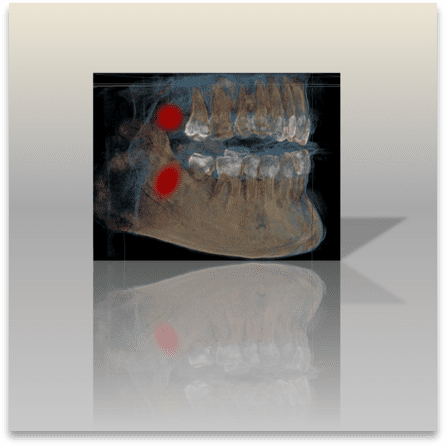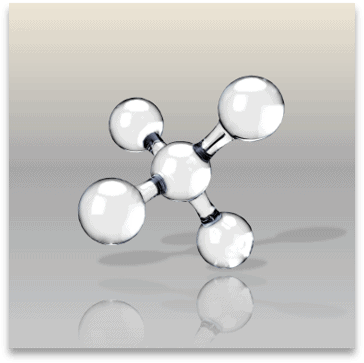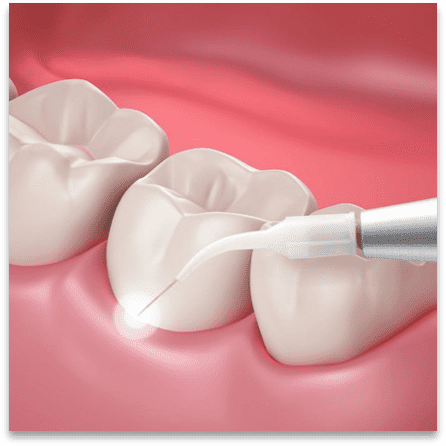As a parent, seeing your child in pain is one of the most challenging experiences you can face.
BIODENTISTRY
CAVITATION

A cavitation (or by the formal name, Ischemic Osteonecrosis) is the process when there is a lack of blood supply to an area of bone thus resulted in “dead” bone. We usually see this occurring in the jawbone. It will be seen as a hole in the jawbone which can occur after a tooth extraction that did not heal correctly.
What goes on after a tooth extraction ?



- Traditionally, it is assumed that after a tooth has been extracted, your system will act to heal the hole that has been left by a missing tooth.
- Often in cases, this is true. However, many tooth extractions can lead to a pathological defect that is known as cavitation.
- There exists a periodontal ligament that consists of several very thin fibers that act to attach the tooth to the jawbone. When a tooth is extracted, these fibers are broken and some are often left in the socket.
Osteoblasts are specialized cells in a bone that function to repair and grow new bone material. When a tooth is removed, the osteoblasts are prevented from filling the socket of the tooth with new bone by the periodontal ligaments, as these ligaments act as a barrier to prevent osteoblasts from growing bone when a tooth is in place.
The ligament fibers need to be removed very effectively and precisely in order for the bone to grow in the socket properly.
- Trauma – an infection or dry socket can occur. (Especially by wisdom teeth extraction which are usually removed at a young age, between the years 14 to 20 years. Young people suffer from several mineral deficiencies due to a strong growth spurt. In many cases, all four wisdom teeth are removed at once under general anesthesia, focusing on the shortest surgery possible. It is difficult to keep all 4 wounds clear of debris. Usually, it is the case that the wound is not fully cleaned and sterilized.
At Dr. Roze BioHealth Clinics, we have found that the most effective ways to sterilize is with laser or ozone therapy. We also try to avoid massive use antibiotics and cortisone which tend to block the immune system’s natural healing process.
- Toxic trauma –periodontal disease, abscess, root canal bacteria or remaining dental materials after extraction can lead to bacteria causing a disruption in the healing process. We have found laser or ozone therapy to be of great value with treating bacterial infections.
- Risk factors –such as smoking, stress, alcoholism, blood-clotting disorders, age (arteries in the jaw tend to decrease in size with age), chemotherapy or radiation treatment for cancer, rheumatoid arthritis, bone dysplasia, changes in atmospheric pressures, osteoporosis, thyroid dysfunction, bisphosphonates (medication for osteoporosis), can all be factors that increase the risk of cavitation.
Recent Blogs
My Child Broke Their Tooth, Now What? A Parent’s Guide to Handling Dental Emergencies
Genomic Testing at ROZE Bio Health Clinic
Explore the emerging trend of ozone therapy in pediatric dentistry. Discover the safe and effective treatment option for dental issues.
Ozone Therapy for Children: The Role of Ozone in Pediatric Dentistry
Explore the emerging trend of ozone therapy in pediatric dentistry. Discover the safe and effective treatment option for dental issues.
Managing Chronic Diseases with Biological Physiotherapy: A Guide to Conquering Silent Inflammation
Silent inflammation is the dark underbelly of the immune system's response mechanism. It operates below the threshold of pain and can persist undetected for years...
3 Things To Consider When Looking For an Integrative Medicine Doctor
In today’s fast-paced world, people are seeking more comprehensive and holistic approaches to their health and wellness.
Dr. Nazish, Pediatric Dentist, Answers Your Most Common Questions
As parents, our children's health and well-being is our utmost concern. While many parents prioritize their children's health and well-being, the significance of pediatric dentistry may not be fully realized.










